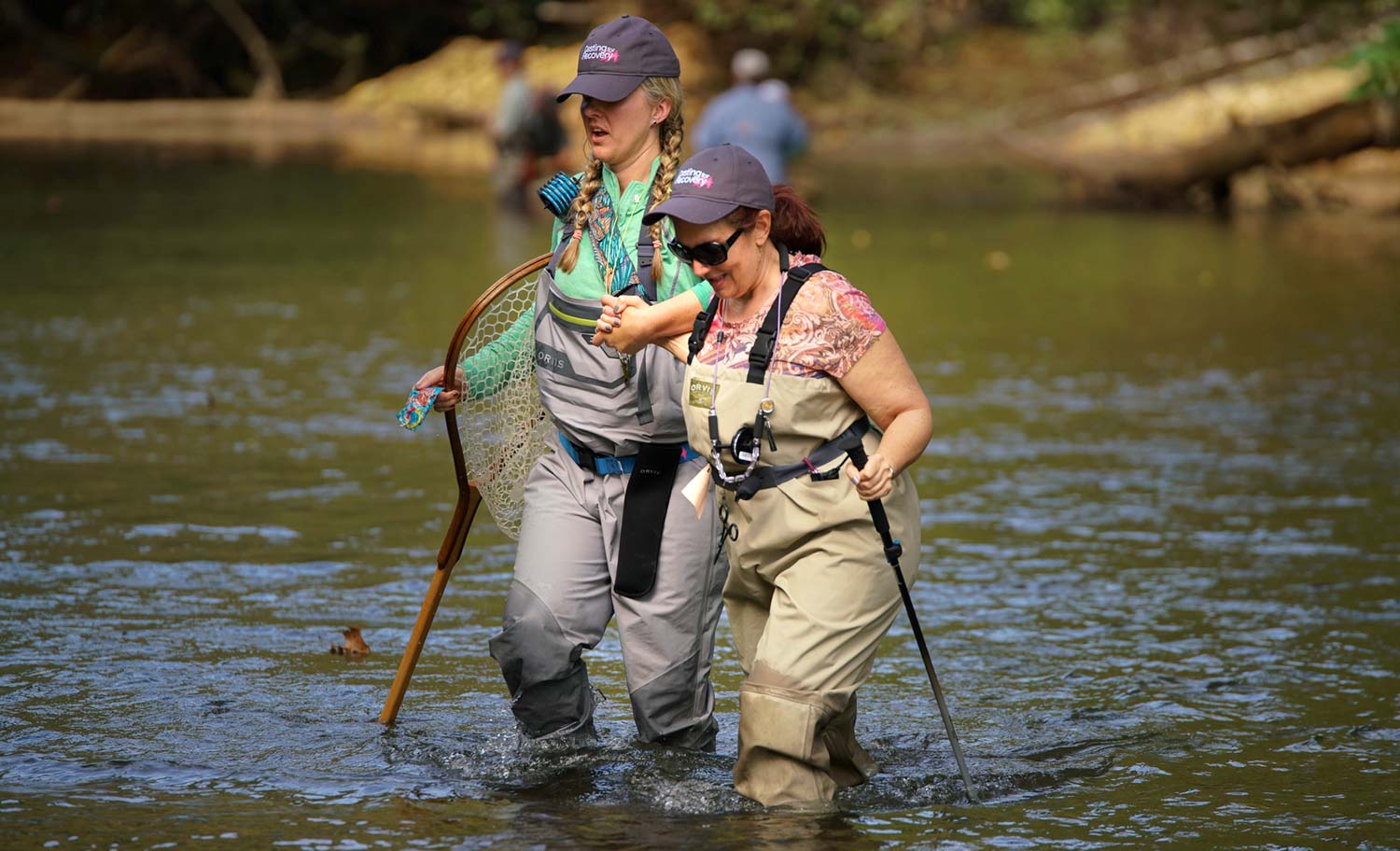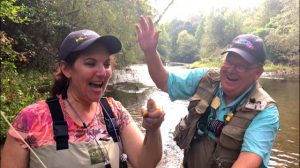
Photo Winged Reel
By: Becca K. Powell
People say that there is healing in the cast; that standing in the middle of a stream is better than any therapy or shrink’s office out there. As fly anglers, we know all too well the truth in this statement.
After a hard week at the office there is nothing like packing up your waders, boots, fly rod, and heading to the mountains to get away from the hustle and bustle of city life. Too many times I’ve seen my husband come home from work and head straight to his fly-tying desk to get his mind off of a stressful day at work. But this sport touches lives in an even more impactful way than just relief from the stresses of every-day life. For many, fly-fishing brings HOPE.
I’ve read stories of men returning from war with injuries from combat, finding the sport of fly-fishing and the solace that comes with standing waist deep in the river. I’ve heard first-hand how the art of fly-tying brought one local soldier with PTSD back to his family. And most recently, the story went viral of how fly-fishing helped young angler Joey Maxim find strength and a new chance at life after a horrific car accident.
Many of these men (and women!) are introduced to the sport through incredible nonprofits like Project Healing Waters, Reel Recovery, and other organizations which aim to bring a new outlook on life to our nation’s soldiers, cancer patients, and other members of the community. It is through these NPOs that we are able to witness first hand the life-changing impact fly-fishing can have on a person. And it is then that we are able to ask ourselves how this sport has changed our lives for the better.
We all have a story – the story of why fly-fishing touched our hearts and souls and what keeps us so passionate about our time on the water. We all have a story of why we yearn for that tug of the line and the thrill that comes with that next big catch. For me, the positive impact of fly-fishing has continued to touch my life through my personal struggles with cancer, and my interaction with the nonprofit Casting for Recovery.
Healing in the Cast
My fly-fishing story began in 2016. That January I had undergone a bi-lateral mastectomy after an invasive breast cancer diagnosis the year prior. After numerous surgeries – and the emotional roller coaster that went with losing my breasts – I found myself on the Chattahoochee River that summer with a fly-rod in hand. That hot August day was the beginning of a journey that would forever change my life (not to mention get me through a second cancer diagnosis).
Later that winter I was introduced to Casting for Recovery by a friend who had been a long-time volunteer with the organization. We were up in the headwaters fishing one afternoon and I casually mentioned the peace I was finding every time I stepped into the water with my fly rod in tow. “Are you familiar with Casting for Recovery?” he asked me. I wasn’t – but as a long-time member of the nonprofit community, I was eager to learn more. Little did I know I was about to find my place within the fly-fishing community, and an opportunity to lend my talents to a cause near and dear to my heart.
Casting for Recovery and Breast Cancer
Casting for Recovery (or CfR) has a simple but important mission – to enhance the quality of life of women with breast cancer through a unique retreat program that combines breast cancer education and peer support with the therapeutic sport of fly fishing.
 Founded in 1996 in Manchester, VT by breast surgeon, Dr. Bonita Walton, and professional fly angler Gwenn Perkins Bogart, the program offers opportunities for women to find inspiration, discover renewed energy for life and experience healing connections with other women and nature. CfR serves women of all ages, in all stages of breast cancer treatment and recovery, at no cost to participants.
Founded in 1996 in Manchester, VT by breast surgeon, Dr. Bonita Walton, and professional fly angler Gwenn Perkins Bogart, the program offers opportunities for women to find inspiration, discover renewed energy for life and experience healing connections with other women and nature. CfR serves women of all ages, in all stages of breast cancer treatment and recovery, at no cost to participants.
For women who have had surgery as part of their breast cancer treatment, as I had, the motion of casting is excellent therapy for increasing mobility in the upper body. Combine that with the spiritual, emotional, and mental benefits of connecting with nature, and you’ve got some pretty incredible medicine.
It was that “spiritual connection” with mother earth that drew me to the sport. There’s something about standing in the water that makes you forget about doctor’s bills, and treatment, and surgeries, and all of the stress that comes with a serious medical diagnosis like cancer. It is truly a moment where everything just slows down. And when you’re managing a cancer diagnosis, that moment of peace and quiet is what you yearn for the most.
Giving Back
My first introduction to CfR was with the Georgia chapter. I was connected with program coordinator Beverly Booth, and immediately set up a meeting. How could I lend my skills as a fundraiser to benefit the local organization? After all, I knew first-hand how impactful fly-fishing had been for me during my battle with cancer.
 I met Beverly for coffee one afternoon and began to learn more about the nonprofit. She threw some pretty incredible statistics my way – that 70% of participants had never been to a support group; that the retreats offered not only the fly-fishing experience, but also focused on health and mental wellness (I learned that nutritionists and counselors were at each retreat); and that retreats were offered across the country and served more than 800 women each year.
I met Beverly for coffee one afternoon and began to learn more about the nonprofit. She threw some pretty incredible statistics my way – that 70% of participants had never been to a support group; that the retreats offered not only the fly-fishing experience, but also focused on health and mental wellness (I learned that nutritionists and counselors were at each retreat); and that retreats were offered across the country and served more than 800 women each year.
I immediately felt a personal connection to the organization, and began to open my rolodex to make connections in the community for funding support (it costs $1,000 to send one woman to a weekend retreat).
Stage IV Metastatic Breast Cancer
My first experience volunteering for a CfR program was during Georgia’s first Stage IV Metastatic Breast Cancer retreat in October 2017. I would be a “River Helper” and was paired with a fly-fishing guide and participant. Amazing Anne only caught one fish that day, a tiny rainbow which still had its parr marks. But the smile that radiated across her face is one that I will never forget.
My personal breast cancer story was very different from the women I found myself surrounded by that Sunday afternoon. Metastatic breast cancer, which starts in the breasts, has spread to vital organs – most commonly the bones, liver, lungs or brain. Many effective breast cancer treatments exist, but if the cancer metastasizes and spreads outside the breasts, there is no cure. I learned that day that 100% of breast cancer deaths occur because of metastasis.
I saw that I was surrounded by warriors that fall afternoon; women managing a terminal illness with grace and strength. These women were able to experience a weekend of peace, healing, and HOPE because of CfR and their mission.
During Georgia’s second Stage 4 Metastatic Breast Cancer retreat this past October, I had the privilege of being a fly-fishing guide. This year I was paired with Exotic Erica, who stepped into that stream with the same warrior spirit I had encountered the year prior. I immediately felt a strong connection with Erica, who quickly picked up the sport after just minutes in the water. While the trout were nowhere to be found that day, she brought a few horny head minnows to the net. And again, I saw that same incredible smile and moment calm that I knew all too well.
#TOFISHISTOHOPE
I heard so many comments from participants this year that made my heart shine. One woman said that her time on the water that day was “the best day in a very long time.” Another told me that for those few hours she “forgot about cancer” and “didn’t feel sick”. I saw first hand the real impact Casting for Recovery has on the participants managing breast cancer diagnosis’ and how the retreat experience truly is life-changing for these women. Casting for Recovery becomes part of their story – one they will never ever forget.
So, Gink and Gasoline readers, I leave you with this…
The next time you find yourself on the water, take a moment and reflect on how fly-fishing has impacted your life. What keeps you coming back for more? Is it the calm after the storm, or the spiritual connection to nature? Is it the thrill of the catch? Whatever the reason, I’m sure it’s a good one. And I KNOW that it is worth sharing with others.
As the season of giving is among us, consider volunteering or lending financial support to organizations like Casting for Recovery. The impact you will make with your time and/or donations will make a profound difference in the lives of these women. And the HOPE that the fly-fishing experience will bring to others is a feel-good moment you will carry with you forever. Take it from this fly angler…it’s the gift that keeps on giving.

I had the honor of guiding a group of women with Casting for Recovery on the Boardman River in Traverse City, MI years ago. The weather was pouring rain and cold, those women out toughed me times 10 and I came away from the experience a changed man. The outdoors has taught me many lessons in life, but those anglers taught me more about life and the joy in living every day to fullest in one day than I had learned in many years in the field or on the water.
Becca…thank you so much for exposing G&G’s readers to the wonderful not-for-profit Casting for Recovery. CfR is so committed to its mission and the ability to — along with nature — make a real difference.
Becca has always been an inspiring person to so many! She shows strength in so many aspects of life and no matter how weak she may be on a particular day…she gives her last bit of herself for others. I am honored to call her my friend!!
What a magnificent story from a truly brave lady. Casting for recovery ( CFR ) Victoria is running a retreat in late April 2019. This will be our first retreat and we have a magnificent group of ladies working flat out to make this a great experience for the participants. I hope all you people out there are having a great festive season and a wonderful 2019.